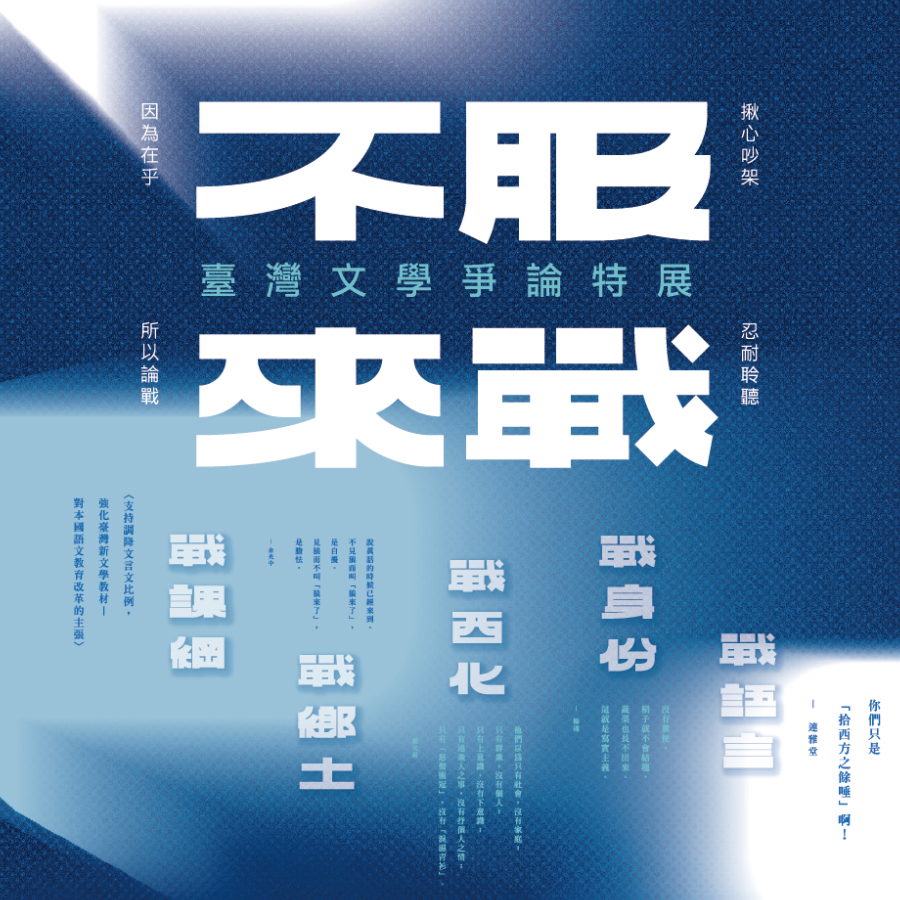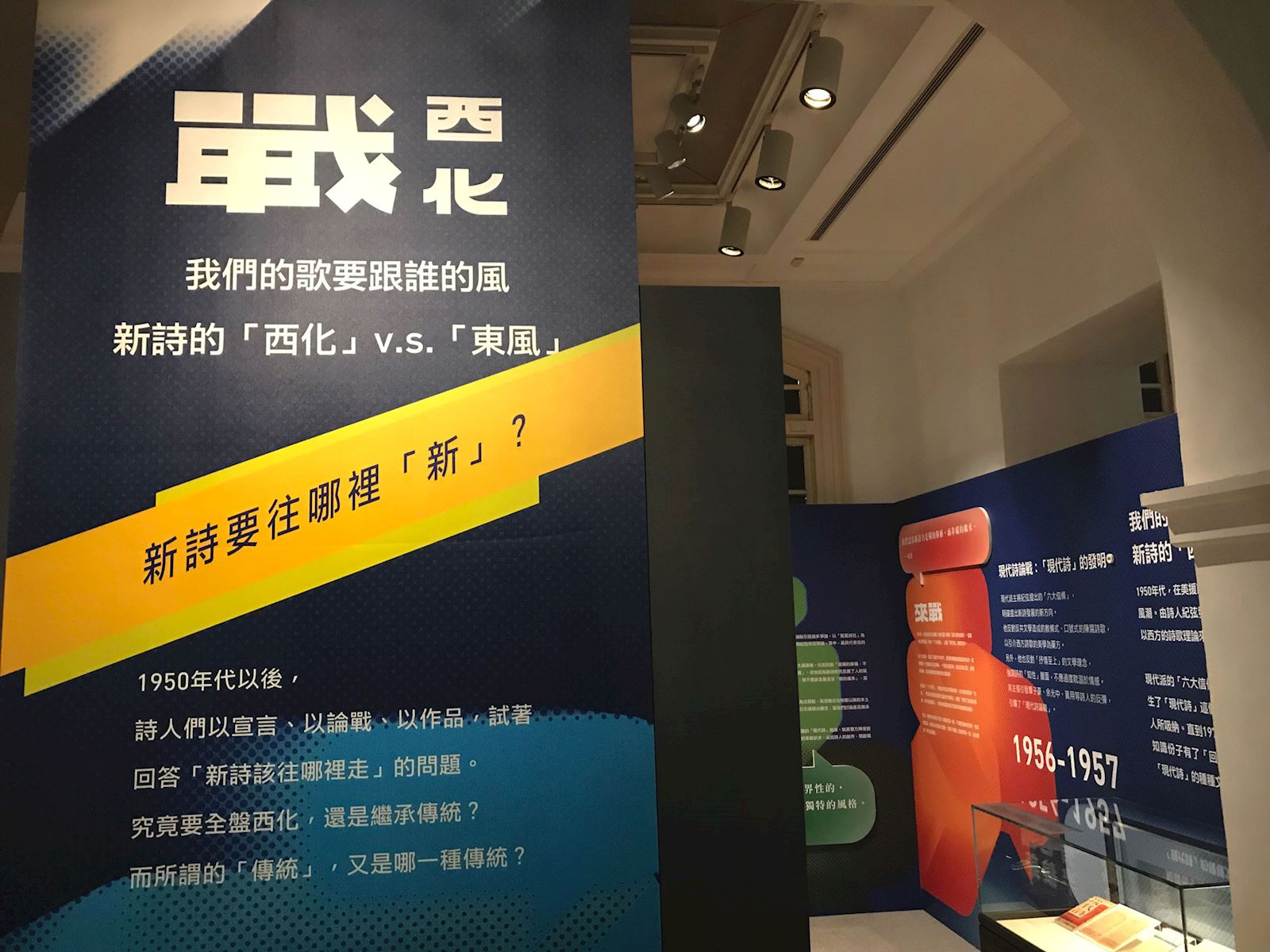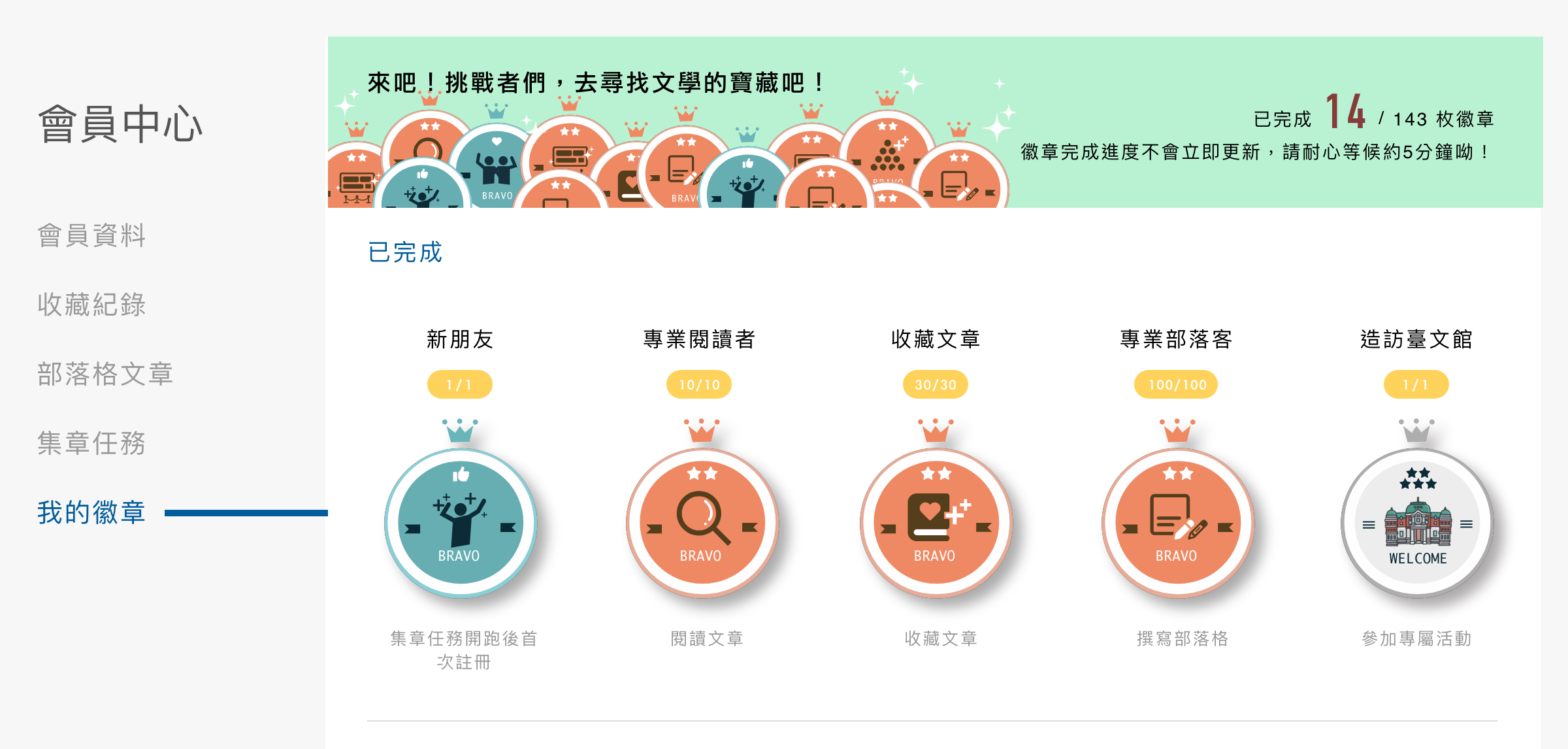How "new" should New Poetry be?
After the 1950s, poets tried to answer the question regarding "the direction of New Poetry" using manifestos, arguments, and literary works. Should they completely accept westernization or inherit the tradition? What kind of tradition is the so-called "tradition"?
【The Main Argument】
In the 1950s, with the support of the U.S., there was a strong wave of westernization in the poetry scene. The modernism school led by poet Xian Ji tried to transform Taiwanese new poetry using western poetic theory.
The "six creeds" of the modernism school was initially faced with a lot of opposition. However, it gave birth to the concept of "Modern Poetry," which was generally accepted by the poets in the 1960s. In the 1970s, Taiwan's international status deteriorated, forcing intellectuals to "return to reality" and reexamine the various literary views regarding modern poetry.
◎ 1956-1957 Modern Poetry Debate: Invention of "Modern Poetry"
The leader of the modernism school, Xian Ji, proposed "the six creeds," which clearly delineated the new direction of Taiwan's new poetry. Ji was opposed to the stale anti-communist poetry filled with dogmatism and slogans, and attempted to introduce Western poetry as the solution. In addition, he was also against the pursuit of sheer lyricism and emphasized the "intellectual" aspect of poems. For him, a poet should not indulge excessively in emotions. His claim triggered opposition from poets such as Tzu-Hao Chin, Kwang-Chung Yu, and Yung Huang, leading to the outbreak of "the debate on modern poetry."
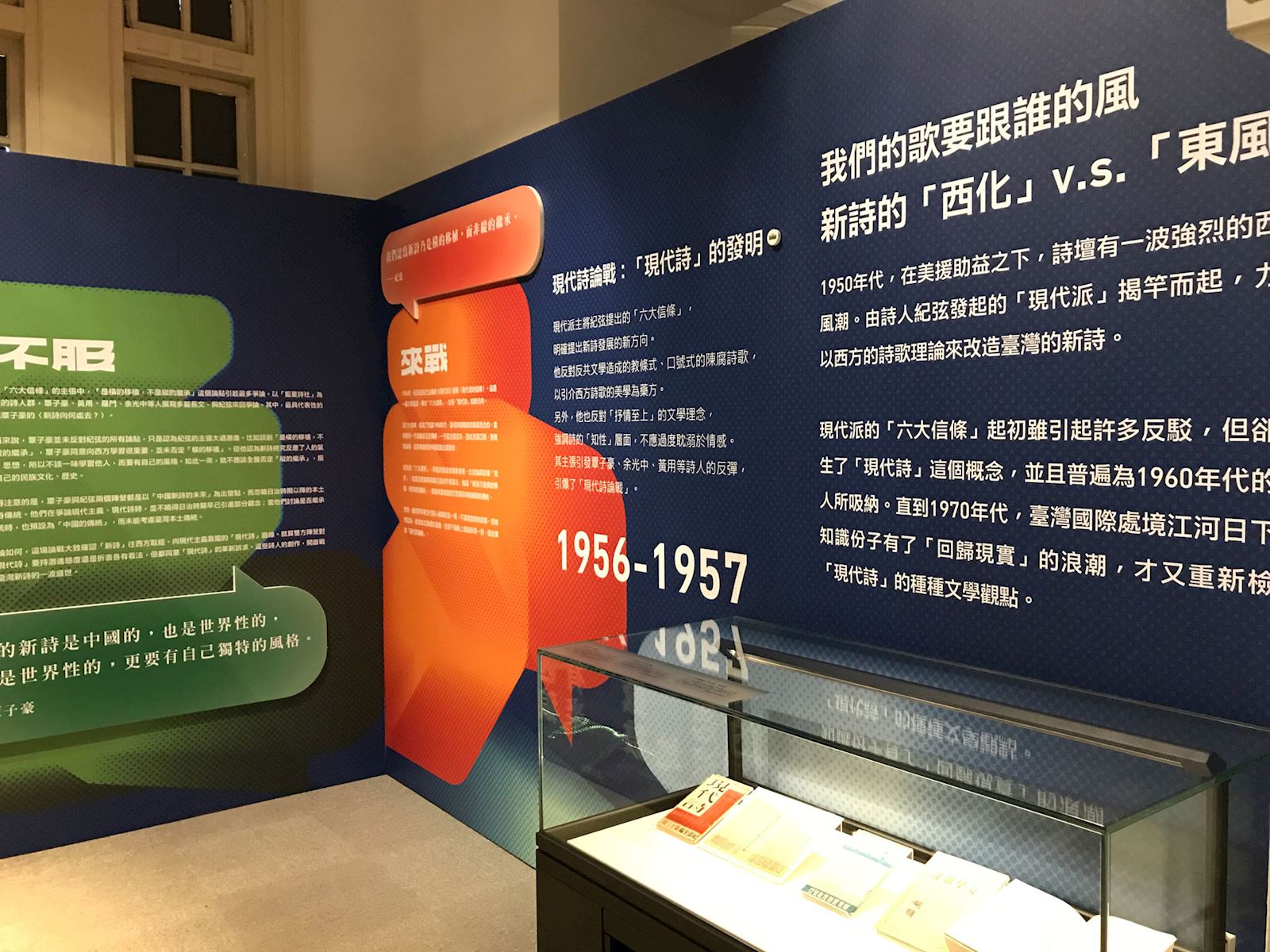
.jpg)
.png) Xian Ji: We think New Poetry belongs to the category of horizontal transplantation instead of vertical inheritance.
Xian Ji: We think New Poetry belongs to the category of horizontal transplantation instead of vertical inheritance. In 1956, Xian Ji published "Creeds of Modernist School" in MODERN POETRY, which was coordinated by himself. This is a literary manifesto, putting forward the "six creeds" and advocating the new direction of "modern poetry."
These six creeds emerged due to the protest against the stale Taiwan's poetry scene in the 1950s. At the time, New Poetry inherited the legacy of the May Fourth Movement; it was simultaneously anti-communist. Therefore, it was filled with catchwords, passion, chanting, and strong Chinese nationalism.
Xian Ji's "six creeds" were published in response to this phenomenon. For example, the creeds stress that poetry should be "cerebral", an opposition against the overflowing lyric style in the poetry scene. The creeds emphasize that "new poetry is a horizontal transplantation instead of vertical inheritance," hoping to break the banal tradition using western thought.
However, though many new-generation poets were dissatisfied with the literary scene, like Xian Ji, they still considered his thinking to be too radical and thought he should compromise a bit in terms of certain arguments. As a result, the modern poetry debate broke out.
 Tzu-Hao Chin: China's New Poetry belongs to China and the world. Since it is international, it should have its own style.
Tzu-Hao Chin: China's New Poetry belongs to China and the world. Since it is international, it should have its own style.Among the arguments in Xian Ji's "six creeds," the claim that "New Poetry is a horizontal transplantation instead of vertical inheritance" was the most controversial. In particular, poets of Blue Star Poetry Society, such as Tzu-Hao Chin, Yung Huang, Men Luo, and Kwang-Chung Yu, wrote many long articles to argue with Xian Ji. Among all of them, the most representative piece was Tzu-Hao Chin's "Direction of New Poetry."
Strictly speaking, Tzu-Hao Chin was not against all the arguments made by Xian Ji. Yet, he considered Ji's arguments too radical. For example, when talking about the "horizontal transplantation instead of vertical inheritance," Tzu-Hao Chin agreed to the importance of learning from the West and did not negate the idea of "horizontal transplantation." However, he thought that New Poetry after all reflected people's temperament and thinking, so it should not be complete imitation; it must develop its own characteristics. Consequently, poets should not completely negate the "vertical inheritance" nor refuse their own nationality, culture, and history.
What is worth noting is that Tzu-Hao Chin and Xian Ji both based their arguments on "the future of Chinese New Poetry" and neglected the tradition of nativist New Poetry since the Japanese rule period. When they were debating over modernism and modern poetry, they did not know that part of the ideas had already been introduced during the Japanese rule period. When they discussed about whether to inherit the literary tradition, they also meant the Chinese literary tradition instead of solely considering Taiwan's local literary tradition.
No matter what, this debate overall confirmed that the direction of "New Poetry" was heading toward the West and modernism. Even if the two camps had contradictory attitudes toward "modern poetry" - radical or compromising, they all agreed to the reform of "modern poetry." The works of these poets created a golden age for postwar Taiwanese new poetry.
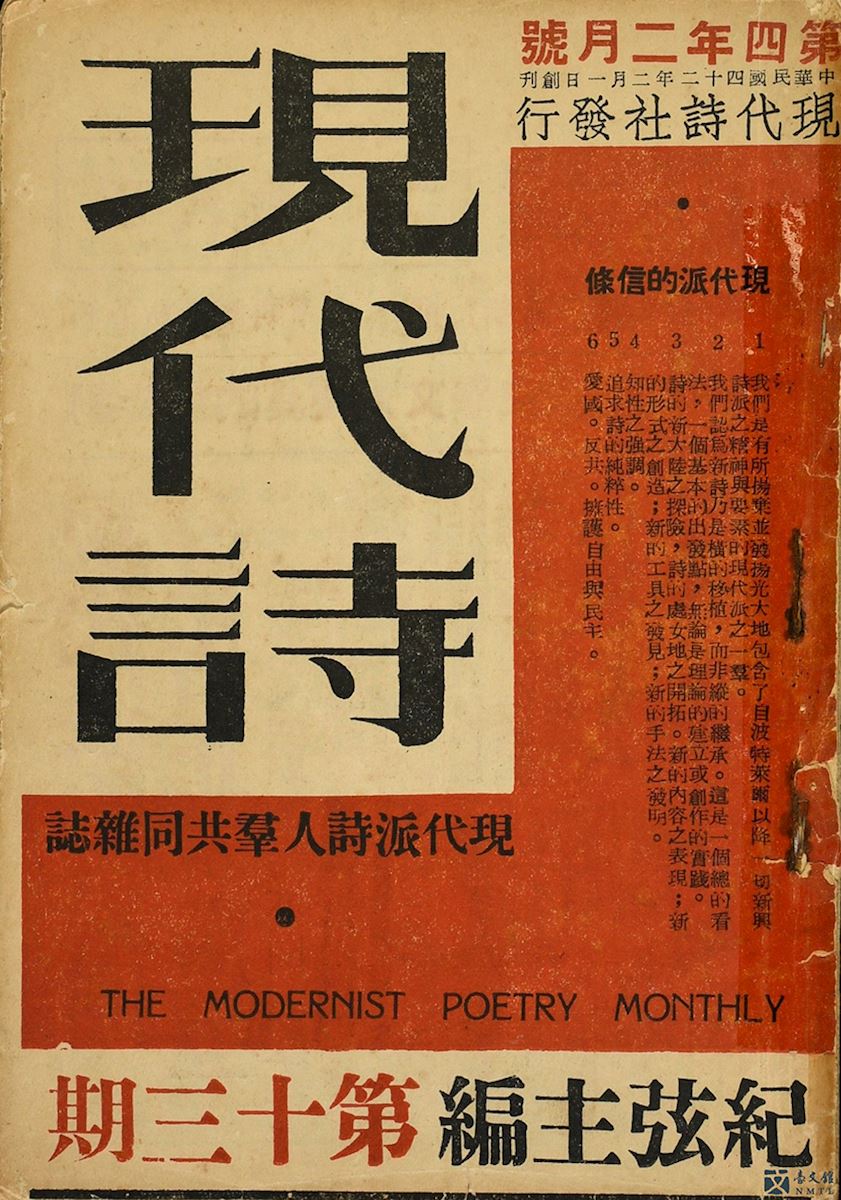
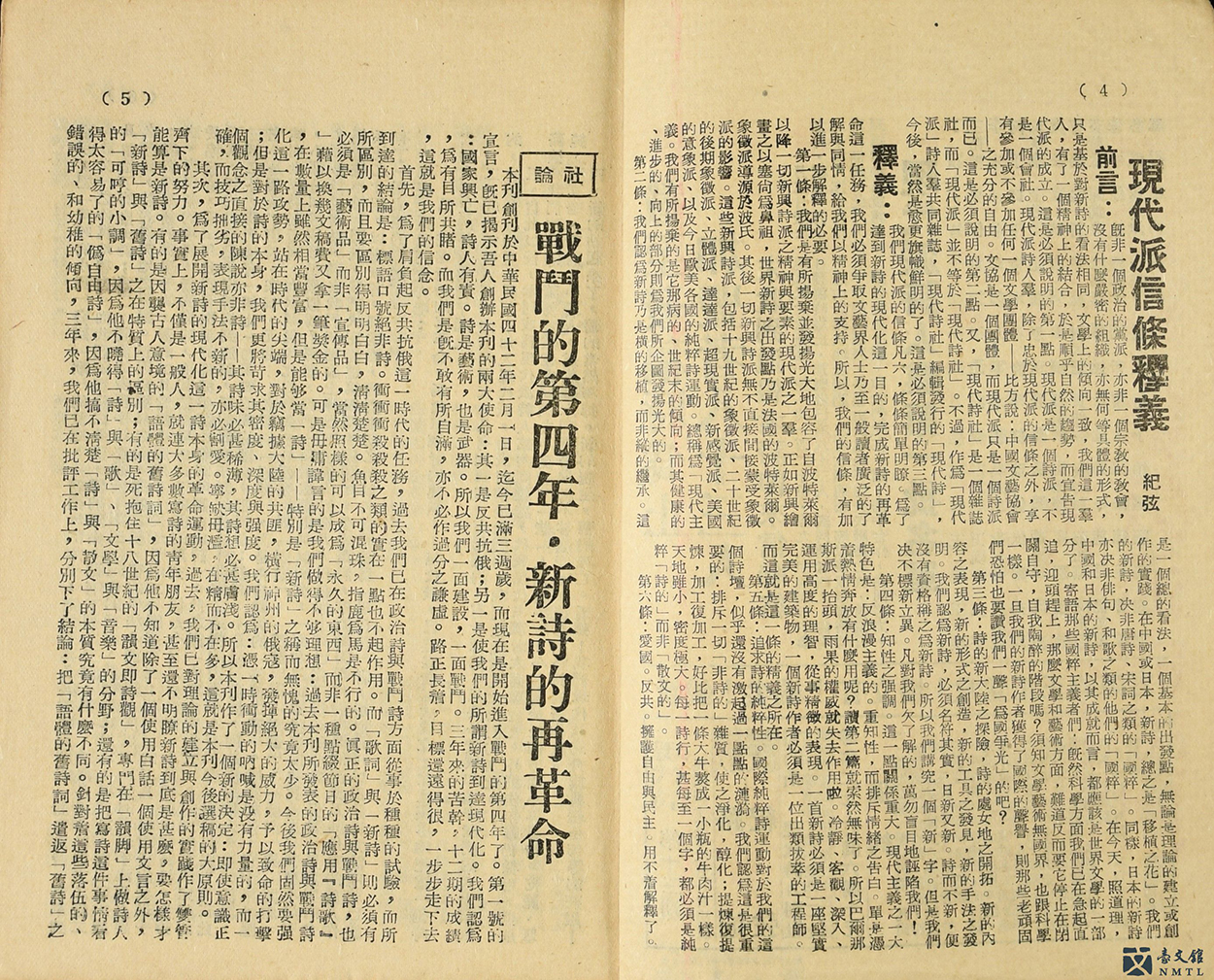
MODERN POETRY Issue 13
MODERN POETRY, coordinated by Xian Ji, proposes "six creeds for modernist school," including the promotion of "all the spirits and elements of the emerging schools of poetry since Baudelaire." Also, the publication puts forward "horizontal transplantation", "emphasis on intellect" and "purity of poetry" to give impetus to Taiwan's poetry scene in the 1950s. In Issue 13, Xian Ji wrote "Explanation of the Creeds for Modernist School," hoping to achieve "modernization of modern poetry" and "re-revolution of modern poetry." This article marked the beginning of the debate over modern poetry in the 1950s. (Donated by Tian-Yi Zhao, Collection of National Museum of Taiwan Literature)
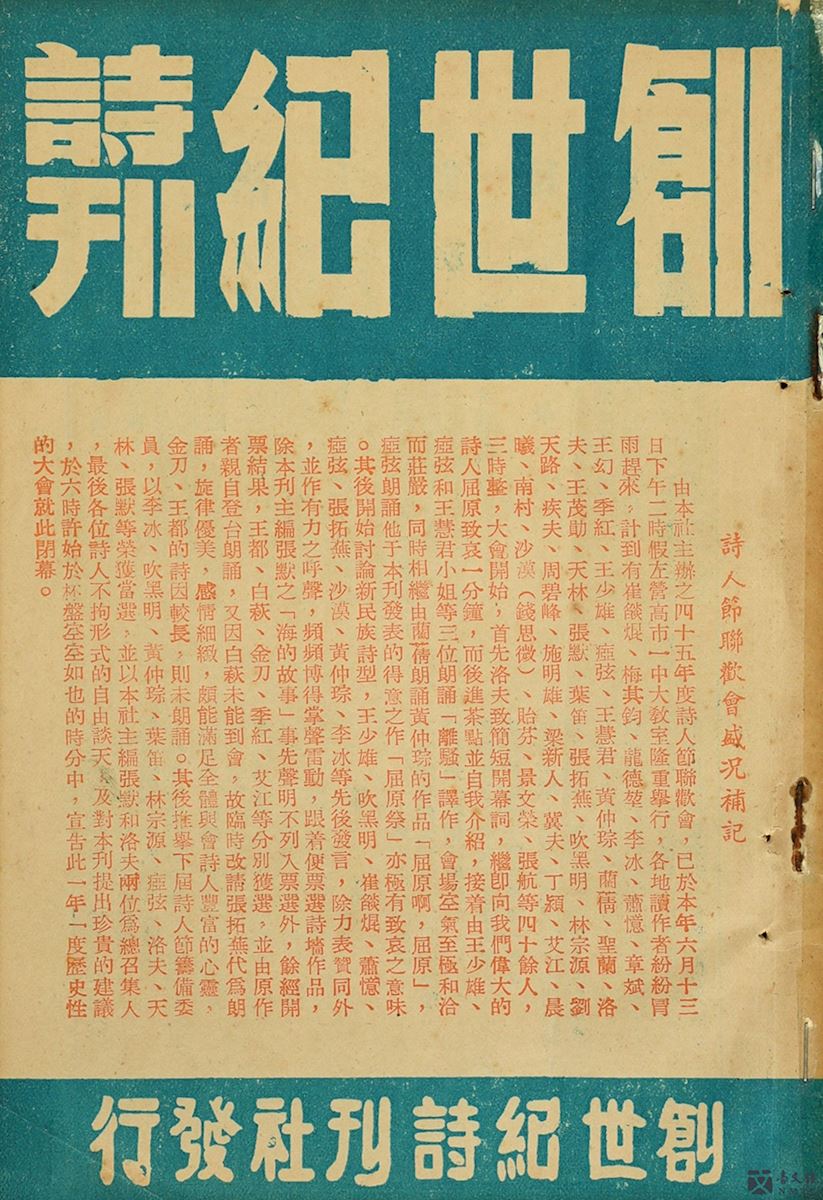
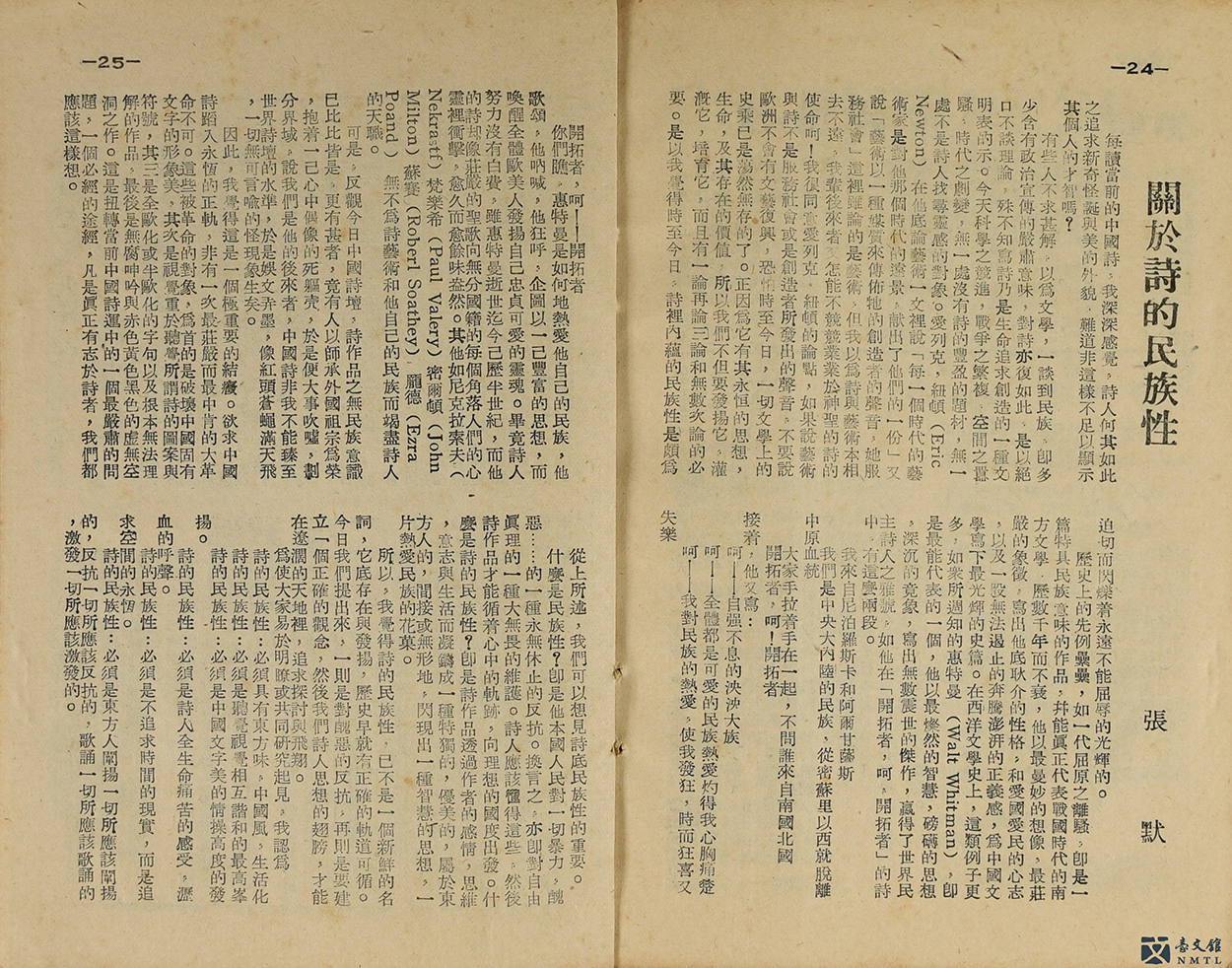
THE EPOCH POETRY QUARTERLY Issue 7
The Epoch Poetry Club was founded in Zuoying, Kaohsiung in 1954 and released THE EPOCH POETRY QUARTERLY. The chief editors were Luo-Fu and Mo Zhang. With Ya-Xian joining later, the three formed the "iron triangle of The Epoch Poetry Quarterly." The Epoch Poetry Quarterly began from the emphasis on the "combativeness of poetry," and then shifted its focus to an anti-modernist school sentiment and called for "nationalist poems." In the 1960s, the magazine was dedicated to surrealism. It played a significant role in the modernization of Taiwan's poetry scene. (Donated by Tianyi Zhao, Collection of National Museum of Taiwan Literature)
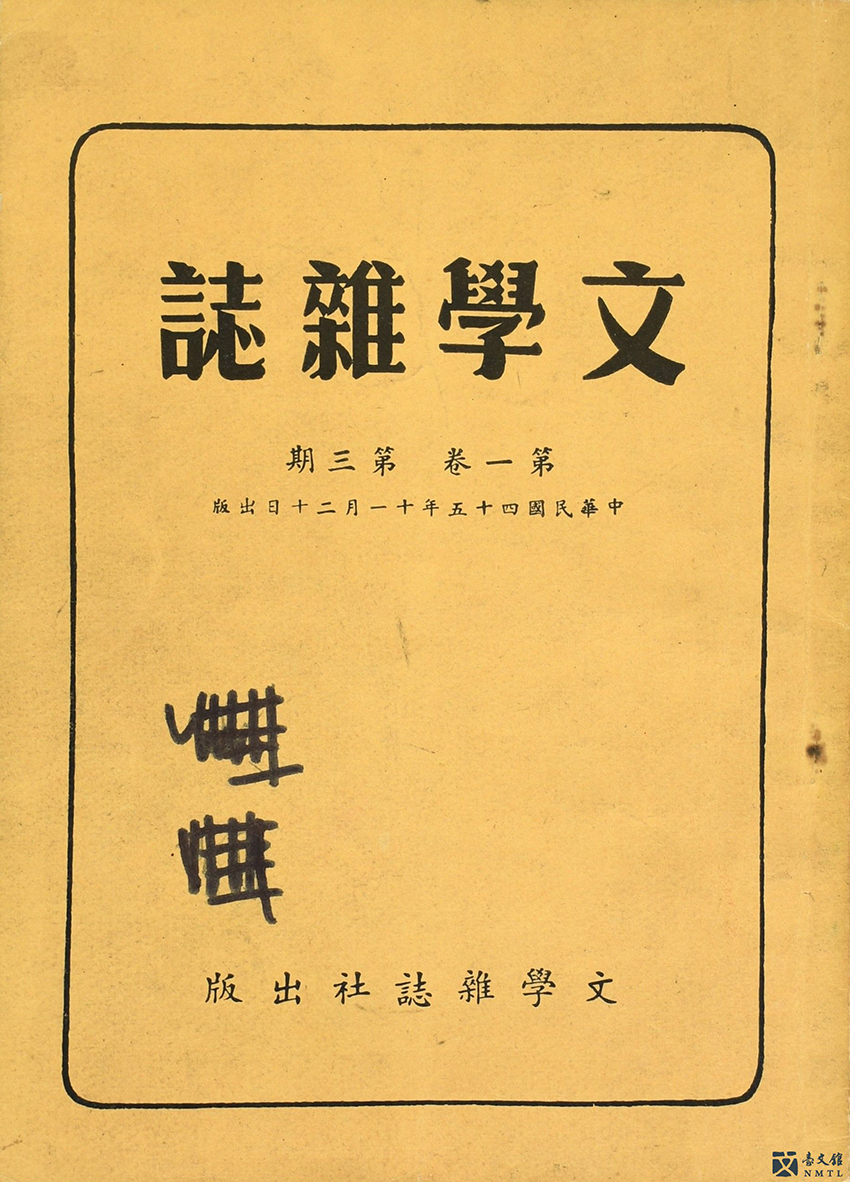
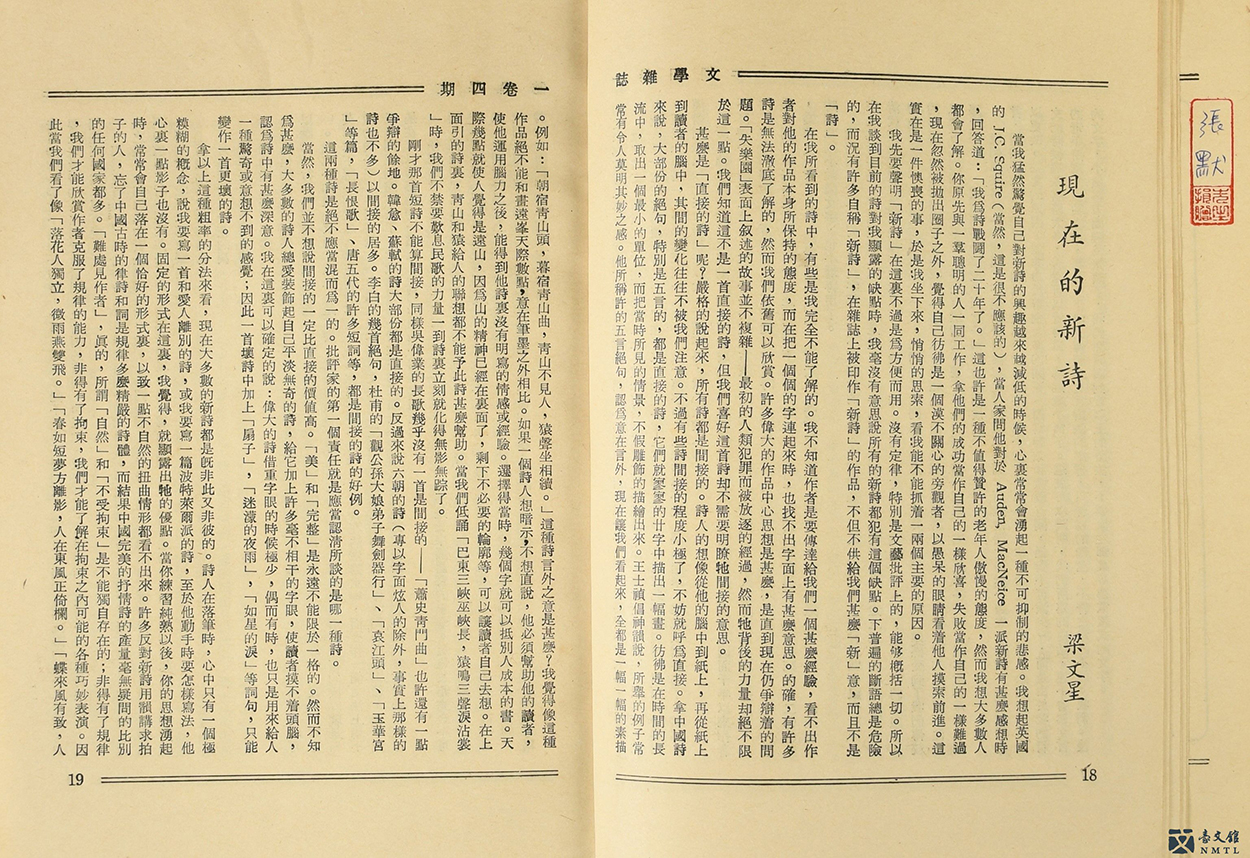
LITERATURE MAGAZINE Issue 3 & 4, Vol. 1
During the modern poetry debate in the 1950s, the emphasis on "horizontal transplantation," led by Xian Ji, stimulated many discussions about the development of modern poetry in the literary scene. First, there was a debate over new and old poetry in LITERATURE MAGAZINE, as well as discussions over the form and content of modern poetry; for instance, "The Current Poetry" by Wen-Xin Liang (real name Xing-Hua Wu) is a work that discusses the form of modern poetry and its development. (Donated by Mo Zhang, Collection of National Museum of Taiwan Literature)
◎ 1972-1974 The Guan Tang Incident: "Return to Nationalism and Reflection on the Era"
In the 1970s, Taiwan was isolated on the global stage. There was a trend of "returning to reality" among intellectuals in Taiwan. Scholars criticized "modern poetry" for being too westernized and demanded that poems should shift their focus back to nationalism and reflect the era. In particular, the "nationalism" here referred to China. It was Chinese nationalism against the West. Scholars who began this debate were Wen-Biao Tang and Jieming Guan. Therefore, the debate was also known as "the Guan Tang incident." On the other hand, poets mostly thought that Guan and Tang focused too much on reality and neglected the aesthetics of literature. The two were also criticized for not being familiar with the development of Taiwan's new poetry as they applied the standards for social movements to the literary movement.

.png) Wen-Biao Tang said, "They were merely the new generation of cultural comprador. With the language barrier and westernization of theory, they sold cultural opium to industrial China."
Wen-Biao Tang said, "They were merely the new generation of cultural comprador. With the language barrier and westernization of theory, they sold cultural opium to industrial China."In the 1970s, Taiwan faced a diplomatic predicament, as the US and Japan cut ties and refuse to recognize the Republic of China. Under this background, the writers began to discuss if "modern poetry" had been over-westernized and peeled away from reality, leading to the "Guan Tang Incident".
"Guan" refers to Jie-Ming Guan while "Tang" refers to Wen-Biao Tang. These two people consecutively published multiple articles criticizing modern poetry and shocked the entire circle of poetry. Although their claims were not identical, the overarching idea was largely similar. Why didn't the "new poetry of China" have a "Chinese resemblance"? Why did the new poetry imitate the west? What is the meaning of poetry when the poetry becomes obscure, convoluted, and detached from the readers?
At some point, Wen-Biao Tang even negated all the accomplishments of Taiwanese modern poetry in the past two decades. Naturally, this kind of radical claim received fierce retaliation from the other poets.
 Yuan-Shu Yan said, "They think that only society exists and not the family, the public, not the individual, the conscious and not the unconscious. They only talk about the issue of the masses but not the emotions of the individual. They only feel the rage and passion but not the sorrow."
Yuan-Shu Yan said, "They think that only society exists and not the family, the public, not the individual, the conscious and not the unconscious. They only talk about the issue of the masses but not the emotions of the individual. They only feel the rage and passion but not the sorrow." This debate lasted for three years with a large group of participants; the debate steered towards different directions multiple times. As Jie-Ming Guan was an English professor in Singapore while Wen-Biao Tang was a mathematics professor, much of the early criticism revolved around whether they were qualified. Based on their backgrounds, some poets questioned whether they truly understood the "new poetry" of "China."
This kind of response that appealed to qualification without being able to directly reply to the claims naturally could not erase the doubt from the rest, thus causing the debate to intensify. However, Wen-Biao Tang's subsequent theories that completely denied modern poetry also caused public outrage, resulting in people siding with the other party.
Yuan-Shu Yan was the most representative among the opposition. When Jie-Ming Guan first challenged modern poetry, Yuan-Shu Yan was supportive. However, after the radical stance made by Wen-Biao Tang, Yuan-Shu Yan published the "Wen-Biao Tang Incident" to refute Tang. Yuan-Shu Yan believed that Wen-Biao Tang "was viewing literature from society's perspective and not viewing society from literature's perspective," as he made the same demand for literature movement as that for a social movement and this critique was unfair for new poetry.
After multiple rounds of debate, the Taiwanese circle of poetry readjusted its path once again and the concept of "return to the nation and reflection of the era" became mainstream. People no longer insisted on modernism. Even those who refuted the views of Guan and Tang basically agreed that the literary debate created by them had impacted the subsequent creation of new poetry. The claims that had yet to be resolved in this debate continued to be a point of contention in the subsequent "nativist literature debate."
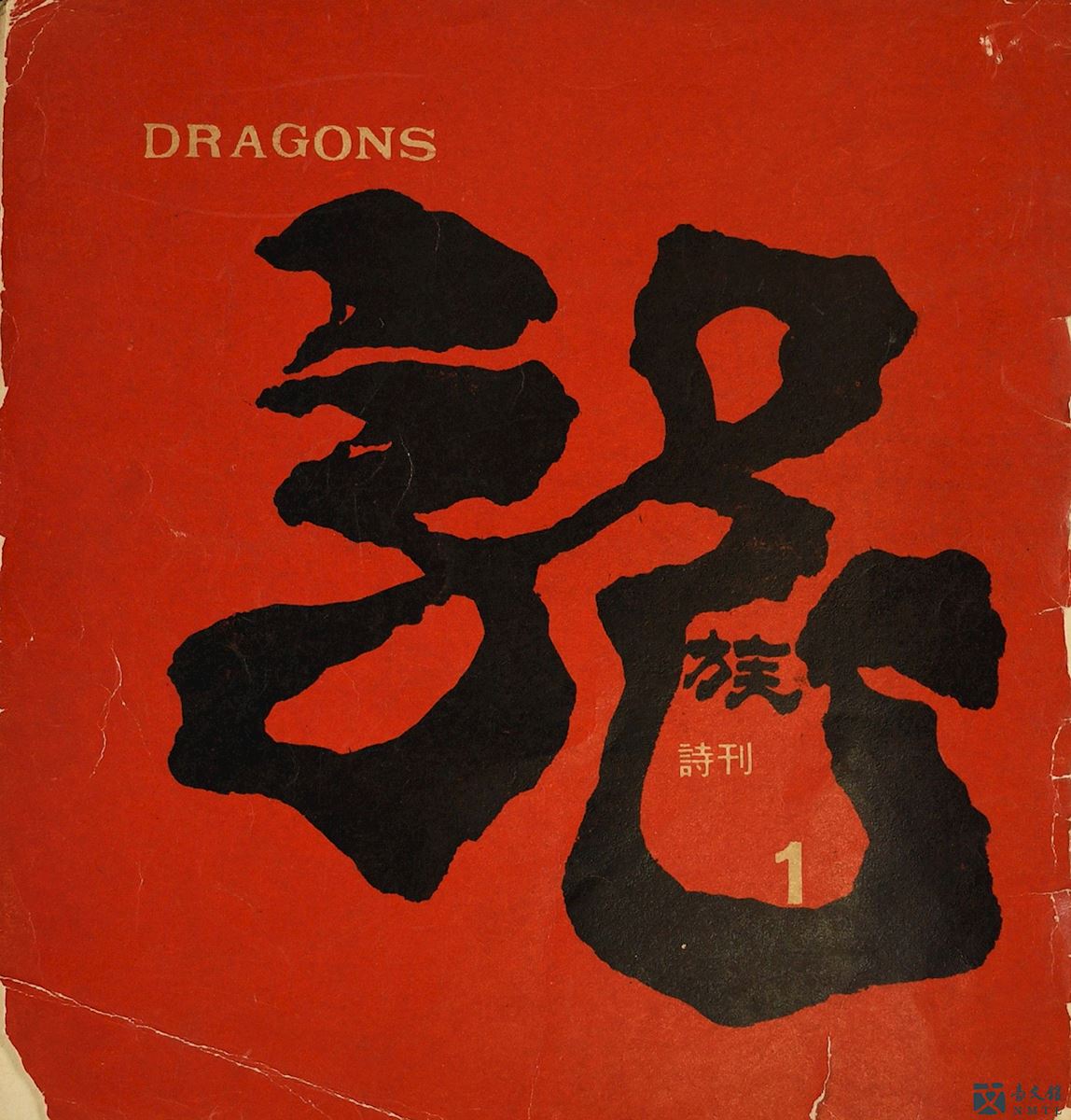
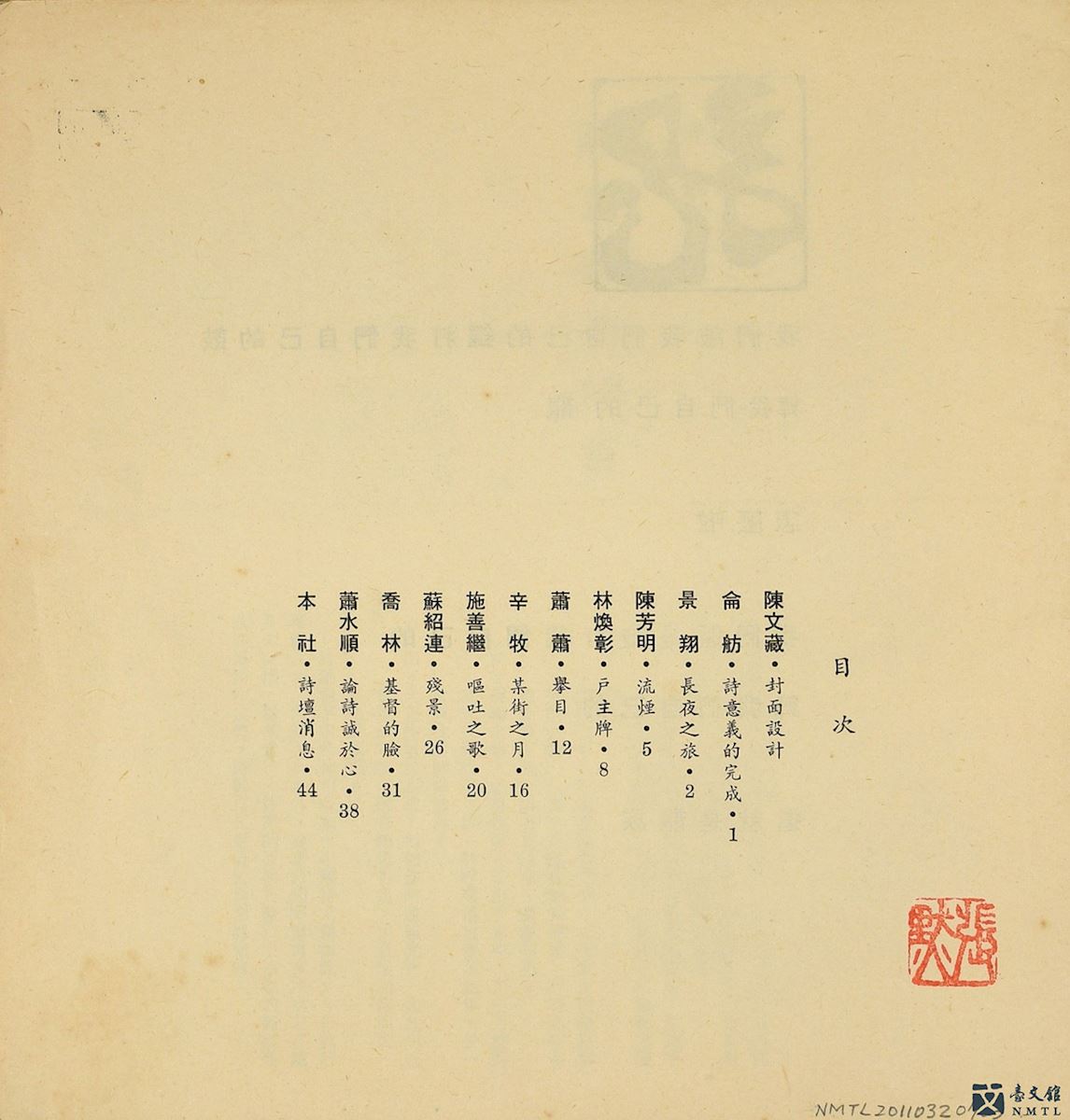
THE DRAGONS First Issue
Named "The Dragons," the publication attempted to facilitate modern poetry's "return to traditions" and reflect on modernism, which had influenced Taiwan's poetry scene since the 1960s. The first issue of THE DRAGONS mentions that "naturally, poetry is meant to criticize society, but we must be open to society's criticism of our poems." At the time, Taiwan was facing the Baodiao movement and the predicament of withdrawing from the UN. The modern poems tried to break through obstacles and showed the energy of caring for society. (Donated by De-Zhong Zhang, Collection of National Museum of Taiwan Literature)
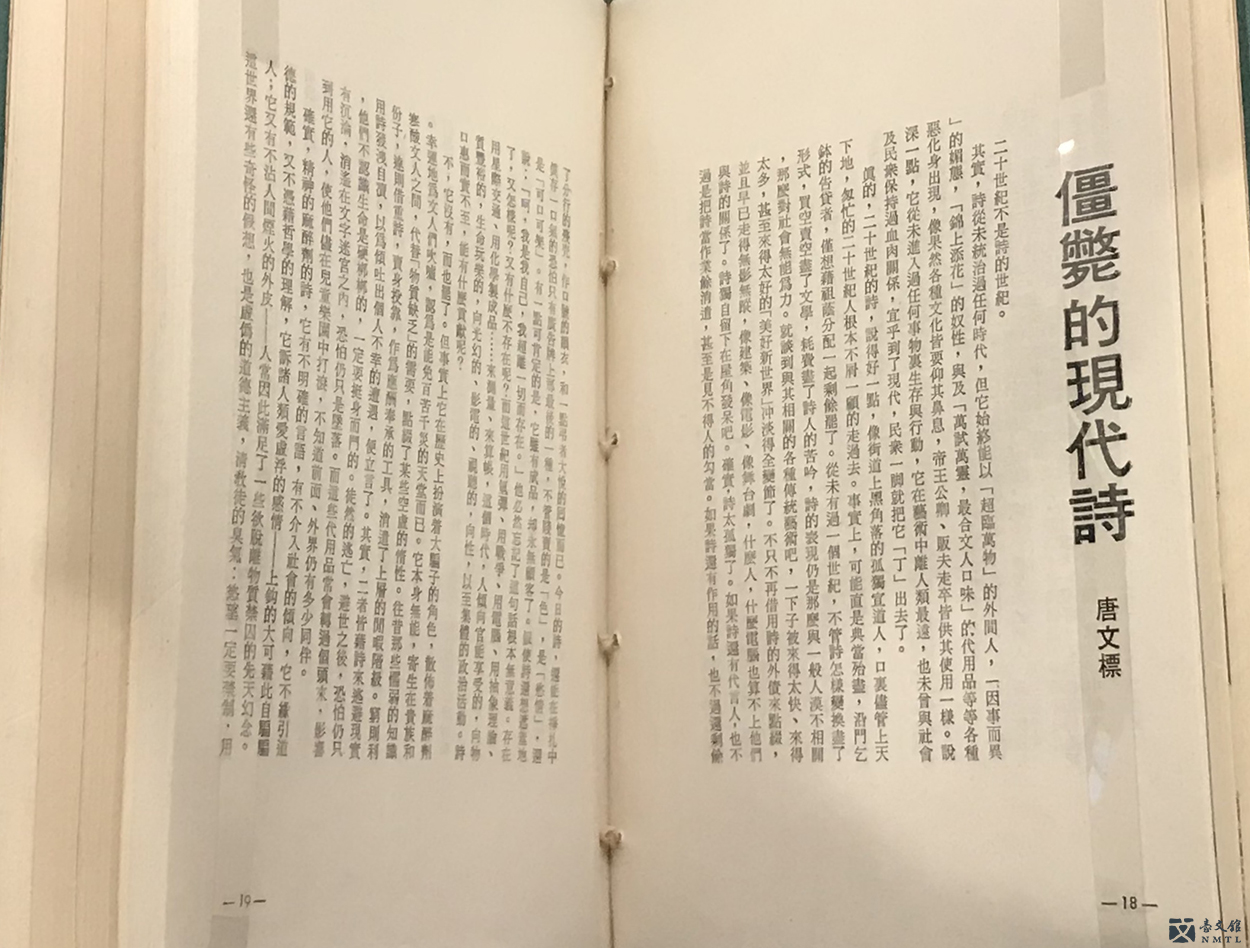
Wen-Biao Tang, "The Stiff Modern Poetry" in CHINESE AND WESTERN LITERATURE Issue 3, Vol. 2
Before Wen-Biao Tang returned to America from his work as a visiting scholar in 1973, he consecutively published four articles to criticize Taiwan's modern poetry. Apart from "The Stiff Modern Poetry," he also published "When, Where, Who – Discussion on Traditional Poetry and Modern Poetry," "The Decline of Poetry – Criticism on the history of new poetry in Taiwan and Hong Kong," and "Self-Criticism for Young People: When the Sun Sets." The articles point out that Taiwan's modern poems have gone in the direction of abstruseness and nihility and ended up only imitating the West. The strong points stimulated heated discussions in Taiwan's literary scene. (Collection of National Museum of Taiwan Literature)
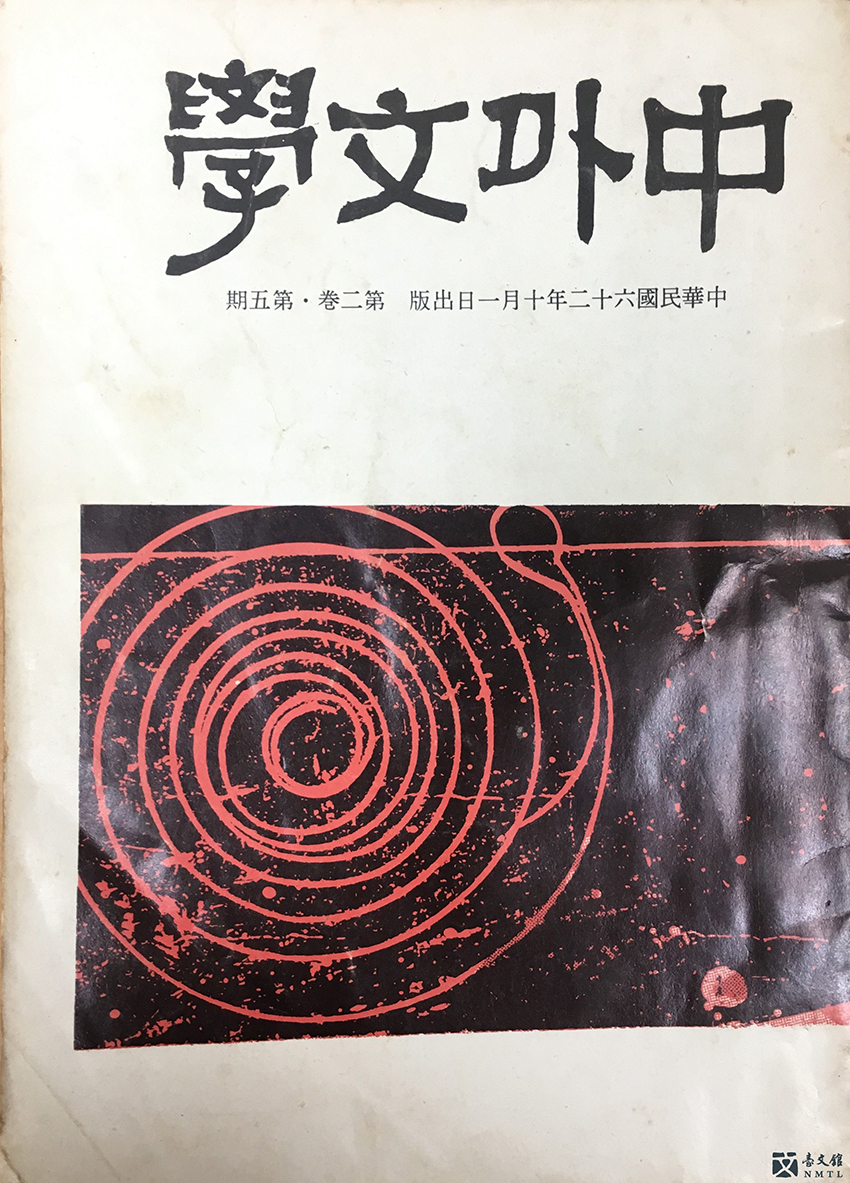
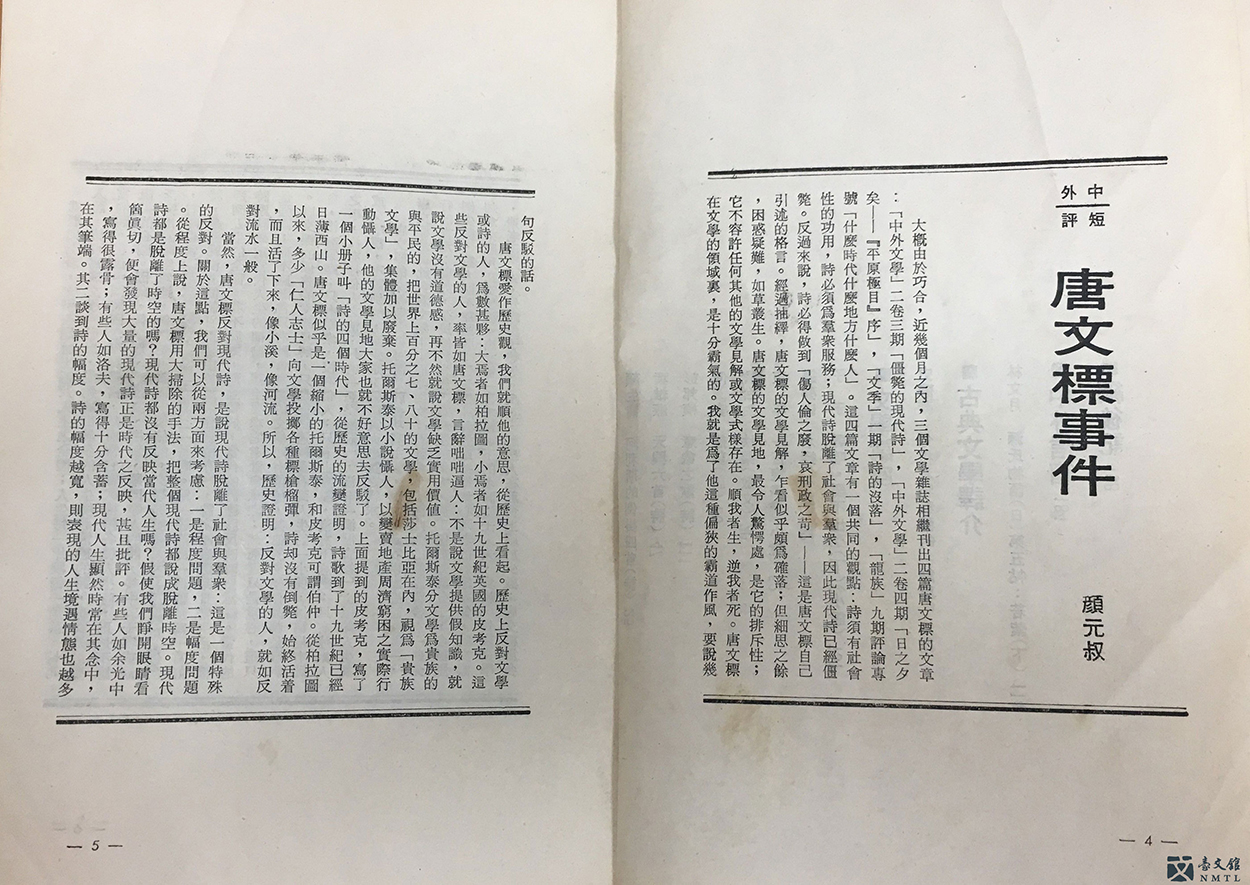
Yuan-Shu Yan, "Wen-Biao Tang Incident" in CHINESE AND WESTERN LITERATURE Issue 5, Vol. 2
In 1973, within only a couple of months, Wen-Biao Tang published four articles criticizing modern poetry. Yuan-Shu Yan named these articles the "Wen-Biao Tang Incident." Yuan-Shu Yan was a key person that introduced New Criticism to Taiwan. He pointed out that Wen-Biao Tang's literary views were based on utilitarianism and considered him to be an expert in social movements, who looked at literature from a social perspective. Yan thought that literary writing must be free and literature should consider "all aspects of life." (Collection of National Museum of Taiwan Literature)
